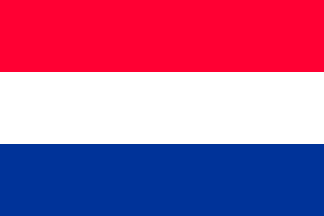



The Netherlands:
Binnenlandse Veiligheidsdienst (BVD)
(National Intelligence and Security Agency)
Note (2002): The BVD has been renamed the Algemene Inlichtingen- en Veiligheidsdienst (AIVD), or General Intelligence and Security Service. The change ensued following adoption of a revised Intelligence and Security Services Act, giving the former BVD [*national* security service] a mandate to gather intelligence abroad on foreign targets. The word "national" [binnenlandse] in the name no longer applied, hence the change to "general" [algemene], i.e. domestic and foreign. See here for a critical assessment of the new AIVD's surveillance authorities.
History
The history of the BVD starts immediately after World War II when, in 1945, the "Bureau for National Security (BNV)" was established. This Bureau was tasked to register the remainder of the German intelligence network in the Netherlands. The BVD itself was established in 1949. In the beginning, this agency mainly targeted espionage by Eastern Europe and the activities of the communists in the Netherlands. In the seventies, the emerging (inter)national terrorism was added to the tasking of the BVD. In the nineties, the agency also became involved in (inter)national organized crime (e.g. drug trafficking and the illegal weapons trade).
Legal basis
The legal basis for the existence and the conduct of the BVD is the "Law of 3 December 1987, containing regulations concerning the intelligence and security agencies (Law on Intelligence and Security Agencies) (WIV, 1987)". Derived from this legal basis, additional guidance and instructions are given, among others, by the Prime Minister, the Ministry of Home Affairs, the Ministry of Defense, the Ministry of Justice, etc.
Tasking
The BVD nowadays is tasked to direct its attention to the gathering of information on the areas of intelligence and security, specifically on organizations or persons, which/who may pose a threat to the national security or other important interests of the state; to conduct personnel security investigations on behalf of the government (excluding the Ministry of Defense) and the 'vital industry'; and taking precautions for the protection of classified or other sensitive information of the government or the 'vital industry'. Besides that, the permanent attention of the BVD is given to (inter)national terrorism, political conflicts abroad (since the deactivation of the IDB -- the former foreign intelligence agency -- in 1994), the illegal weapons trade, the activities of foreign intelligence and security agencies and services in the Netherlands, and the harming of the integrity of the government.
Locations
In the course of its history, the BVD conducted activities from various locations in and around The Hague. They moved into the present location at Leidschendam, which is a suburb of the city of The Hague, in the late nineties, and which offers sufficient space for all activities which are conducted by the personnel of the BVD. Besides that, since the nineties, the BVD has some 'liaison officers' in various cities of the world, from the United States of America to the Far East.
Personnel strength
In December 2000, a total of some 594 personnel were employed by the BVD: 197 women and 397 men. The number of personnel members of a foreign origin, employed by the BVD, nowadays is 57.
Liaison
The BVD maintains permanent liaison on the national level with the Military Intelligence and Security Agency (MID), the Central Criminal Information Agency (CRI), the national government Internal Affairs Division (Rijksrecherche), the District Attorney's Office (OM), the police and other law enforcement agencies. Internationally, the BVD maintains contacts with friendly, foreign intelligence and security agencies (e.g. by permanent presence of liaison officers or participating in international committees).
Accountability
Of course, the BVD has to account for its activities and other work in accordance with its legal basis, the WIV, 1987, amongst others, to the Dutch Parliament (Committee for Intelligence and Security Agencies of the 2nd Chamber), the 'Ministrial Committee for the Intelligence and Security Agencies (MICIV) (Prime-Minister (to include the Coordinator for Intelligence and Security Agencies), the Minister of Home Affairs, the Minister of Defense (to include the Director MID). On a lower level, 'governmental porch', to the 'Committee of Unified Intelligence Agencies the Netherlands (CVIN), in which, amongst others, the Coordinator for the Intelligence and Security Agencies, the Head of the BVD, the Director of the MID, etc.
Reviews/Reports/Etc
In accordance with the WIV, 1987, every year the BVD is obliged to account in writing to the Dutch Parliament on its activities and other work. This is done by the BVD on a yearly base by issuing the 'Annual Year Review BVD �(year)�', which is the publicly available version. Besides that, there is, of course, the classified annual year review, which is exclusively for the Committee for Intelligence and Security Agencies (CIV) of the Dutch Parliament and some privileged authorities (amongst others, The Prime-Minister, the Minister of Home Affairs, the Minister of Defense, the Head of the MID, etc.).
For internal use and only for a limited number of sister and similar agencies, the BVD biweekly issues an information bulletin. In this, recent occurrences/incidents in relation to the security and other interests of importance in the Netherlands are listed. In view of its contents, this document is classified as 'Confidential'.
Notes and Related Resources
http://www.fas.org/irp/world/netherlands/bvd.htm
Created by John Pike
Maintained by Steven Aftergood






